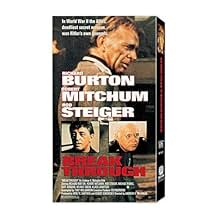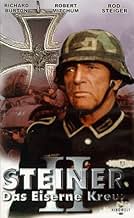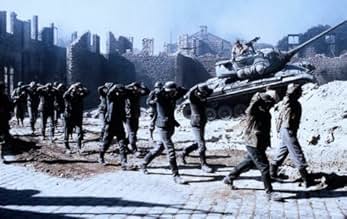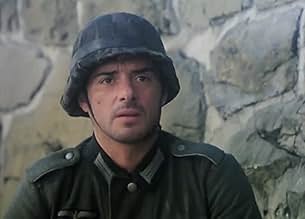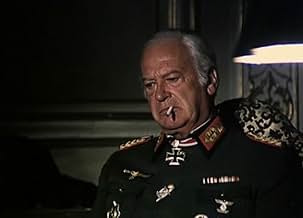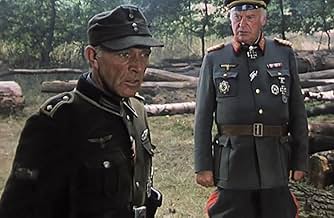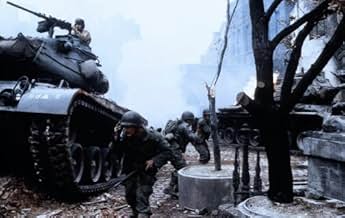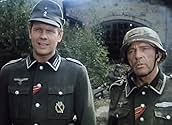IMDb RATING
5.0/10
1.6K
YOUR RATING
In 1944 a German sergeant gets involved in an anti-Hitler conspiracy, and saves the life of an American colonel.In 1944 a German sergeant gets involved in an anti-Hitler conspiracy, and saves the life of an American colonel.In 1944 a German sergeant gets involved in an anti-Hitler conspiracy, and saves the life of an American colonel.
- Director
- Writers
- Stars
Véronique Vendell
- Yvette
- (as Veronique Vendell)
Michael Büttner
- Schütze Junghans
- (as Wolfgang Büttner)
- Director
- Writers
- All cast & crew
- Production, box office & more at IMDbPro
Featured reviews
Shoddy, shoestring budgeted alleged sequel to Peckinpah's "Cross of Iron" notable solely for the troika of superb actors who don't seem to care.
Burton as the war loathing Sgt.Steiner is simply too old. Dead-eyed and sunken cheeked, he growls a German accent that slips more readily than a stricken panzer retreating in the Russian winter. Steiger has barely three scenes but exhibits his customary late period bipolarism, roaring from rage to serenity in seconds with little in between. Mitchum is made of teak, reacting to the death of his only pal, the jeep driver, as if he had dropped a grocery receipt.
Every aspect of this accidental comedy is anaemic and threadbare; the implausible plot, emaciated script, jagged cutting and even the celluloid seems to have been dipped in coffee. Perhaps the creme de la cack is the score which seems to feature an orchestra of two.
Burton as the war loathing Sgt.Steiner is simply too old. Dead-eyed and sunken cheeked, he growls a German accent that slips more readily than a stricken panzer retreating in the Russian winter. Steiger has barely three scenes but exhibits his customary late period bipolarism, roaring from rage to serenity in seconds with little in between. Mitchum is made of teak, reacting to the death of his only pal, the jeep driver, as if he had dropped a grocery receipt.
Every aspect of this accidental comedy is anaemic and threadbare; the implausible plot, emaciated script, jagged cutting and even the celluloid seems to have been dipped in coffee. Perhaps the creme de la cack is the score which seems to feature an orchestra of two.
1944, Nazis are suffering a crushing defeat,Richard Burton commands a group of misfit soldiers for a dangerous mission .This is a rugged WWII Actioner concerning about the experienced Sergeant Steiner, he's assigned by Colonel Nazi (Curd Jurgens)to contact enemy for a treaty of peace . The Nazi commando turns out to be a rag-tag, oddball and motley gang (a largely cast formed by Klaus Lowitsch, Werner Pochath, among others), under command Sergeant Steiner . The commando led by Steiner get a chance to redeem themselves by execute a risked mission. The picture stars Robert Mitchum as American Colonel who is saved by heroic German Sergeant. Then the mission is suspended when the Nazi authorities (Gunter Meisner) thwart an attempt on Hitler's life, the famous event ,¨the 20 July plot¨ designed by Claus Von Stauffemberg. Later on, they are sent on yet another new mission by staff command (Major Nazi played by Helmut Griem and captains performed by Joachin Hansen and Horst Janson) . Later its cancellation they must participate in suicidal missions, the first to wipe a French village and prepare an assault over a strong position located on the hill where are the Allied tanks led by General Rogers (Robert Mitchum) and assistant (Michael Parks). Finally the American infantry, artillery and tanks enter on the village at some spectacular scenes.
This tiring wartime movie about the heroics of weary German soldiers results to be a following to ¨Sam Peckimpah's Cross of Iron¨ .This dull war film of marginal interest packs frantic thrills, perilous assignments, relentless feats,and buck-loads of explosive action and violence.The noisy action is uniformly bad-made, only deserving of mention the rip-roaring final scenes on the impregnable village. Like most Warlike movies , there is some of action-packed , but that alone can't help the worn-out argument or usual clichés.Serious and rough Richard Burton is average as leader of the motley pack together thwart the the Nazi schemes, as well as the largely secondary cast with special mention to Rod Steiger as vociferous general. This is is a wartime typical vehicle and inferior into the warlike commando genre, which also belongs the classics from the 60 as 'Dirty dozen(Robert Aldrich), 'Where eagles dare(Brian G. Hutton)' and 'Kelly's heroes(again Hutton)'. The motion picture is badly realized by Andrew V McLagen, son of the great actor Victor McLagen. He's a warlike expert , such as proved in several films(Return to Kwai,Wild Geese, Dirtdozen: the next mission,Sea wolves). However director McLagen proved had lost the touch that made ¨Devil's brigade¨, ¨Sea wolves¨ and specially ¨Wild Geese¨ such memorable films. ¨Breakthrough¨ cannot be called great and did not received , deservedly, much acclaim when released. Certainly a lousy work done by one of Hollywood's more skill director, a real craftsman.
This tiring wartime movie about the heroics of weary German soldiers results to be a following to ¨Sam Peckimpah's Cross of Iron¨ .This dull war film of marginal interest packs frantic thrills, perilous assignments, relentless feats,and buck-loads of explosive action and violence.The noisy action is uniformly bad-made, only deserving of mention the rip-roaring final scenes on the impregnable village. Like most Warlike movies , there is some of action-packed , but that alone can't help the worn-out argument or usual clichés.Serious and rough Richard Burton is average as leader of the motley pack together thwart the the Nazi schemes, as well as the largely secondary cast with special mention to Rod Steiger as vociferous general. This is is a wartime typical vehicle and inferior into the warlike commando genre, which also belongs the classics from the 60 as 'Dirty dozen(Robert Aldrich), 'Where eagles dare(Brian G. Hutton)' and 'Kelly's heroes(again Hutton)'. The motion picture is badly realized by Andrew V McLagen, son of the great actor Victor McLagen. He's a warlike expert , such as proved in several films(Return to Kwai,Wild Geese, Dirtdozen: the next mission,Sea wolves). However director McLagen proved had lost the touch that made ¨Devil's brigade¨, ¨Sea wolves¨ and specially ¨Wild Geese¨ such memorable films. ¨Breakthrough¨ cannot be called great and did not received , deservedly, much acclaim when released. Certainly a lousy work done by one of Hollywood's more skill director, a real craftsman.
A film can usually be judged on its own merits. But a film claiming to be a sequel to Peckinpah's "Cross of Iron" and featuring some of the greatest actors who ever lived needs to be held to a high standard. "Breakthrough" is a waste of time and fails in virtually all departments.
The plot cannot be taken seriously. It begins in late May of 1944, during the German retreat on the Eastern Front. "Cross of Iron" is set in January of 1943, yet our sequel begins where it left off, yet it's almost 16 months later. We are immediately introduced to several familiar characters, none of whom seem to measure up with their personalities from the original film. Sergeant Steiner (Richard Burton) is ordered by Captain Stransky (Helmut Griem) to blow up a railroad tunnel in order to prevent the Russians from using it. Steiner's squad fails miserably. Stop again: Coburn's Steiner was a crack NCO. He wiped out several different Russian outposts, patrols and tanks with style. It's out of character for Steiner to be defeated to easily by one lousy Russian tank. Anyway: Steiner takes a breather in Paris, right as the Allies land in Normandy. His unit is transported to France, where they occupy the village of St. Bologne. General Hoffman (Curd Jurgens) appears and orders Steiner to cross the enemy lines and inform the American commanders (Robert Mitchum and Rod Steiger) that the German high command is plotting to assassinate Hitler and would like to surrender. This plan comes undone, and the American forces move to attack St. Bologne which Stransky has planned to blow up a plot which will wipe out the attackers and the civilian inhabitants.
That's quite a bit to cram into one film, and McLaglen doesn't seem to know where he's going with this material. This is a very open-ended film, with little to link the sequence of events except pure coincidence. The script is serviceable on its own, but nothing here compares to "Cross". For starters, this new film ignores the last ten minutes or so of "Cross" and picks up right after the death of Lt. Triebig. Steiner appears to have no remorse against Stransky and, along with Kruger (Klaus Lowitsch) and Anselm (Dieter Schidor), joins the retreating force. Burton's portrayal of Steiner is simply unacceptable. For one thing, he's a bit too old and haggard to be considered a combat sergeant. He never gets involved in any physical action for this exact reason. Instead, he merely delivers dialog with a phony German accent and kills just as many Americans as fellow Germans as he seems confused as to whose side he's on. Unlike Coburn's Steiner, Burton's fails to stand for anything: he is loyal to his men, but winds up killing several of them in order to keep a promise to Colonel Rogers (Mitchum).
The film also fails miserably because, despite a slew of Hollywood legends and some familiar German actors, the acting is banal and limited. Mitchum and Steiger are both wasted in mediocre roles as American officers. Steiger's part is particularly disappointing, as he always seems sincere but isn't given very much to work with. The only American actor in the ensemble who seems properly placed in Michael Parks in a small but seemingly-enjoyed role as Sgt. Anderson, who tags along with Mitchum on various dangerous outings. Dare I forget to mention the presence of the legendary Curd Jurgens, who gets little to do here but plays his typical typecast role of an aristocratic German General with gusto despite his obviously forced surroundings!
The cast is chock full of German supporting actors, all of whom are forced into roles beneath their acting ability. Helmut Griem ("The McKenzie Break") is a pretty sorry stand-in for Maximilian Schell. He sure seems interested in getting his Iron Cross, but theme is reduced to an occasional reference or gag. The new Stransky is nothing more than a typical, one-dimensional Nazi out for American blood. Klaus Lowitsch is back and is a lot of fun as Corporal Kruger, although his character has changed, too: now he's wearing a German uniform and it's hard to tell is his cynicism is sincere. Werner Pochath ("Wartime") is a predictable pervert amongst the ranks of Steiner's squad; Gunter Meisner ("Is Paris Burning?") pops up in his usual role as a creepy SS officer; Horst Janson ("Shout at the Devil") is completely wasted as Steiner's company commander; even Joachim Hansen ("The Eagle has Landed") has a minimal role as Hoffman's aide. This film yearns for James Mason and David Warner, whose characters are simply forgotten in the midst of the chaos.
On its own, "Breakthrough" still fails to make any sort of impression. The lack budgetary restrictions show up in nearly every frame. The first few scenes are composed almost entirely of stock footage from "Cross of Iron" and "The Battle of Neretva", while the rest feature a tremendous lack of extras and flair. We rarely see more than half-dozen actors on screen at one time, and the battle in the St. Bologne uses many of the same shots more than once, alternate takes of some shots, and some rather shabby soundstages. The direction always seems pretty standard and unimaginative; McLaglen, who's usually at least a competent director, doesn't take any chances in this film. Nothing happens that we haven't seen before, and the lack of flair makes the whole affair seem even more pedestrian. The music score is ill-fitting and badly written. It's composed mostly of symphonic cues which belong in a spaghetti western or perhaps one of Antonio Margheriti's early sci-fi adventures but certainly not an anti-war film! Fans of the cast will be disappointed. Fans of its predecessor will be severely disappointed. It's even a let-down for me, and I consider myself a pretty opened-minded war film fan. Don't even bother with this one.
The plot cannot be taken seriously. It begins in late May of 1944, during the German retreat on the Eastern Front. "Cross of Iron" is set in January of 1943, yet our sequel begins where it left off, yet it's almost 16 months later. We are immediately introduced to several familiar characters, none of whom seem to measure up with their personalities from the original film. Sergeant Steiner (Richard Burton) is ordered by Captain Stransky (Helmut Griem) to blow up a railroad tunnel in order to prevent the Russians from using it. Steiner's squad fails miserably. Stop again: Coburn's Steiner was a crack NCO. He wiped out several different Russian outposts, patrols and tanks with style. It's out of character for Steiner to be defeated to easily by one lousy Russian tank. Anyway: Steiner takes a breather in Paris, right as the Allies land in Normandy. His unit is transported to France, where they occupy the village of St. Bologne. General Hoffman (Curd Jurgens) appears and orders Steiner to cross the enemy lines and inform the American commanders (Robert Mitchum and Rod Steiger) that the German high command is plotting to assassinate Hitler and would like to surrender. This plan comes undone, and the American forces move to attack St. Bologne which Stransky has planned to blow up a plot which will wipe out the attackers and the civilian inhabitants.
That's quite a bit to cram into one film, and McLaglen doesn't seem to know where he's going with this material. This is a very open-ended film, with little to link the sequence of events except pure coincidence. The script is serviceable on its own, but nothing here compares to "Cross". For starters, this new film ignores the last ten minutes or so of "Cross" and picks up right after the death of Lt. Triebig. Steiner appears to have no remorse against Stransky and, along with Kruger (Klaus Lowitsch) and Anselm (Dieter Schidor), joins the retreating force. Burton's portrayal of Steiner is simply unacceptable. For one thing, he's a bit too old and haggard to be considered a combat sergeant. He never gets involved in any physical action for this exact reason. Instead, he merely delivers dialog with a phony German accent and kills just as many Americans as fellow Germans as he seems confused as to whose side he's on. Unlike Coburn's Steiner, Burton's fails to stand for anything: he is loyal to his men, but winds up killing several of them in order to keep a promise to Colonel Rogers (Mitchum).
The film also fails miserably because, despite a slew of Hollywood legends and some familiar German actors, the acting is banal and limited. Mitchum and Steiger are both wasted in mediocre roles as American officers. Steiger's part is particularly disappointing, as he always seems sincere but isn't given very much to work with. The only American actor in the ensemble who seems properly placed in Michael Parks in a small but seemingly-enjoyed role as Sgt. Anderson, who tags along with Mitchum on various dangerous outings. Dare I forget to mention the presence of the legendary Curd Jurgens, who gets little to do here but plays his typical typecast role of an aristocratic German General with gusto despite his obviously forced surroundings!
The cast is chock full of German supporting actors, all of whom are forced into roles beneath their acting ability. Helmut Griem ("The McKenzie Break") is a pretty sorry stand-in for Maximilian Schell. He sure seems interested in getting his Iron Cross, but theme is reduced to an occasional reference or gag. The new Stransky is nothing more than a typical, one-dimensional Nazi out for American blood. Klaus Lowitsch is back and is a lot of fun as Corporal Kruger, although his character has changed, too: now he's wearing a German uniform and it's hard to tell is his cynicism is sincere. Werner Pochath ("Wartime") is a predictable pervert amongst the ranks of Steiner's squad; Gunter Meisner ("Is Paris Burning?") pops up in his usual role as a creepy SS officer; Horst Janson ("Shout at the Devil") is completely wasted as Steiner's company commander; even Joachim Hansen ("The Eagle has Landed") has a minimal role as Hoffman's aide. This film yearns for James Mason and David Warner, whose characters are simply forgotten in the midst of the chaos.
On its own, "Breakthrough" still fails to make any sort of impression. The lack budgetary restrictions show up in nearly every frame. The first few scenes are composed almost entirely of stock footage from "Cross of Iron" and "The Battle of Neretva", while the rest feature a tremendous lack of extras and flair. We rarely see more than half-dozen actors on screen at one time, and the battle in the St. Bologne uses many of the same shots more than once, alternate takes of some shots, and some rather shabby soundstages. The direction always seems pretty standard and unimaginative; McLaglen, who's usually at least a competent director, doesn't take any chances in this film. Nothing happens that we haven't seen before, and the lack of flair makes the whole affair seem even more pedestrian. The music score is ill-fitting and badly written. It's composed mostly of symphonic cues which belong in a spaghetti western or perhaps one of Antonio Margheriti's early sci-fi adventures but certainly not an anti-war film! Fans of the cast will be disappointed. Fans of its predecessor will be severely disappointed. It's even a let-down for me, and I consider myself a pretty opened-minded war film fan. Don't even bother with this one.
This is one of those movies that, for me, is tough to categorize/rate. On the one hand, Breakthrough is nothing more than a poorly made B-grade war movie -- hardly worth watching. On the other hand, it's bad enough to make it worth watching -- provided, of course, you have a soft spot in your heart for terrible movies, you have friends who like terrible movies, and, of course, you have enough alcohol to swill while watching it.
What's wrong with it? Well, for starters, the story is fairly ridiculous. Secondly, the score is, for lack of a better term, weird -- it's hardly evocative of Europe in 1944, but more akin to really bad 60s hippie music (or something like that). Burton & Mitchum, both seasoned actors, spend the majority of the film "phoning-in" their lines -- you get the strong impression that this movie was nothing more than "contractual obligation" for the both of them. The other aspect of this film that we thought was really amusing was the number of times a high ranking military officer is out, walking around alone (or with one other person), in the middle of the night, well within the front lines. Who the heck does that!?
The other thing we found odd about this movie, is the fact that the production values reek of late 70s / early 80s made-for-TV-movies. Was this movie originally destined for the small screen?
So, in the end, I would recommend that you avoid this movie. Unless, of course, you enjoy bad movies, and have friends who enjoy bad movies (it would help if they're also self-styled WWII buffs).
Good movie rating: 4/10 Bad movie rating: 6/10
What's wrong with it? Well, for starters, the story is fairly ridiculous. Secondly, the score is, for lack of a better term, weird -- it's hardly evocative of Europe in 1944, but more akin to really bad 60s hippie music (or something like that). Burton & Mitchum, both seasoned actors, spend the majority of the film "phoning-in" their lines -- you get the strong impression that this movie was nothing more than "contractual obligation" for the both of them. The other aspect of this film that we thought was really amusing was the number of times a high ranking military officer is out, walking around alone (or with one other person), in the middle of the night, well within the front lines. Who the heck does that!?
The other thing we found odd about this movie, is the fact that the production values reek of late 70s / early 80s made-for-TV-movies. Was this movie originally destined for the small screen?
So, in the end, I would recommend that you avoid this movie. Unless, of course, you enjoy bad movies, and have friends who enjoy bad movies (it would help if they're also self-styled WWII buffs).
Good movie rating: 4/10 Bad movie rating: 6/10
This movie is very disappointing. Following on the heels of the fascinating Cross of Iron, this flick is a true dud. Richard Burtons' Sgt. Steiner (as opposed to James Coburns'portrayal in CofI) might have been intriguing but for the bland, and badly made film that surrounds him. Wheras Cross of Iron had at least a feasable script, the main theme of of war disillusionment and the plot to kill Hitler just gets in the way. I suspect this whole red herring was added to make the movie more palatable for its German co-producers etc.(or vice versa) the score by the Berlin Orchestra is ridiculous, and sounds like something from a fast paced breaking news cast; Also very distracting. Regardless, Burtons' enigmatic portrayal of a stereotypically stoic German soldier stands out. It is just too bad this movie's makers failed to capitalize on their best assets: their actors!
Did you know
- TriviaRobert Mitchum recalled that Richard Burton was drinking very heavily during filming and sometimes had to be carried onto the set.
- GoofsThey went to the trouble to get a lot of things right, from the German artillery pieces to the T-34 tanks. Even the German trucks are mostly right. They didn't necessarily do such a good job on the colors. That Kubelwagen in the dark-gray color scheme is anachronistic for the period. But then we come to the aircraft. I was taken aback to see U.S. Navy Corsairs dropping bombs on the Eastern Front. And what are all those Heinkel 111s doing in the air on D-Day?
- Quotes
Sgt. Rolf Steiner: NCOs cannot resign.
- Alternate versionsA longer German language version runs at 126 minutes, extra scenes includes:
- An opening scene that starts at the railway station, Rolf Steiner and Paul Anselm meet again and discuss their current predicament. Captain Stransky appears out of the station building and sends Steiner and Anselm to check out a railway tunnel down the line. Steiner and Anselm meet up with Corporal Kruger before returning to the station. (8mins approx)
- When Steiner returns to German lines, the scene where he meets his new platoon is longer and includes introductions to new comrades Rothe, Dorfmann and Keppel.
- An extended scene between Yvette and Steiner at her apartment.
- Steiner is mocked by an old woman as he leaves Yvette's apartment.
- The two orphaned children Steiner looks at, at the end turn up earlier and throw rocks at Steiner.
- The final battle is extended, there is more footage of the American GIs attacking the town, the American tanks cause greater damage to the town. Steiner shoots GIs whilst trying to defend the townspeople.
- ConnectionsFeatures Croix de fer (1977)
- How long is Breakthrough?Powered by Alexa
Details
- Runtime
- 1h 51m(111 min)
- Sound mix
- Aspect ratio
- 1.66 : 1
Contribute to this page
Suggest an edit or add missing content

